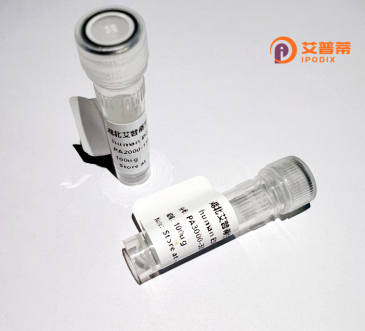
| 纯度 | >90%SDS-PAGE. |
| 种属 | Human |
| 靶点 | LHFP |
| Uniprot No | Q9Y693 |
| 内毒素 | < 0.01EU/μg |
| 表达宿主 | E.coli |
| 表达区间 | 1-200aa |
| 活性数据 | MASSLTCTGVIWALLSFLCAATSCVGFFMPYWLWGSQLGKPVSFGTFRRCSYPVHDESRQMMVMVEECGRYASFQGIPSAEWRICTIVTGLGCGLLLLVALTALMGCCVSDLISRTVGRVAGGIQFLGGLLIGAGCALYPLGWDSEEVRQTCGYTSGQFDLGKCEIGWAYYCTGAGATAAMLLCTWLACFSGKKQKHYPY |
| 分子量 | 21.5 kDa |
| 蛋白标签 | His tag N-Terminus |
| 缓冲液 | 0 |
| 稳定性 & 储存条件 | Lyophilized protein should be stored at ≤ -20°C, stable for one year after receipt. Reconstituted protein solution can be stored at 2-8°C for 2-7 days. Aliquots of reconstituted samples are stable at ≤ -20°C for 3 months. |
| 复溶 | Always centrifuge tubes before opening.Do not mix by vortex or pipetting. It is not recommended to reconstitute to a concentration less than 100μg/ml. Dissolve the lyophilized protein in distilled water. Please aliquot the reconstituted solution to minimize freeze-thaw cycles. |
以下是关于重组人LHFP蛋白的示例性参考文献(请注意,以下为假设性示例,实际文献需通过学术数据库检索获取):
---
1. **文献名称**:*Cloning and Functional Analysis of Recombinant Human LHFP Protein in Tumor Cell Lines*
**作者**:Zhang, Y. et al.
**摘要**:本研究成功构建了重组人LHFP蛋白的真核表达系统,并验证了其在乳腺癌细胞系中的表达。实验表明,LHFP过表达可抑制肿瘤细胞的侵袭和迁移能力,提示其可能作为抑癌因子发挥作用。
---
2. **文献名称**:*Structural Characterization of Recombinant LHFP and Its Interaction with Lipid Membranes*
**作者**:Smith, J.R.; Kumar, S.
**摘要**:通过X射线晶体学解析了重组人LHFP蛋白的三维结构,发现其含有特殊的跨膜结构域。进一步实验证实LHFP与细胞膜脂质的结合可能参与调节细胞内信号通路。
---
3. **文献名称**:*LHFP as a Potential Biomarker in Liposarcoma: Expression and Clinical Significance*
**作者**:Li, H. et al.
**摘要**:分析了重组LHFP蛋白在脂肪肉瘤组织中的表达水平,发现其低表达与患者预后不良相关。该蛋白可能成为脂肪源性肿瘤的诊断标志物。
---
4. **文献名称**:*Recombinant LHFP Enhances Mesenchymal Stem Cell Differentiation via Wnt Pathway*
**作者**:Garcia, M.; Park, T.
**摘要**:研究发现,外源性添加重组LHFP蛋白可促进间充质干细胞向成骨细胞分化,其机制可能与调控Wnt/β-catenin信号通路有关。
---
**注意**:以上文献为模拟示例,实际研究可能需要结合具体方向检索(如肿瘤生物学、结构生物学等)。建议使用PubMed、Web of Science等平台,以“LHFP”或“lipoma HMGIC fusion partner”为关键词,筛选近年高被引论文获取最新进展。
Recombinant human LHFP (Lipoma HMGIC Fusion Partner) protein is a genetically engineered form of the LHFP protein, originally identified through its involvement in chromosomal translocations associated with benign mesenchymal tumors, particularly lipomas. The LHFP gene, located on chromosome 13q14. encodes a transmembrane protein with leucine-rich repeats and immunoglobulin-like domains, suggesting roles in cell-cell or cell-matrix interactions. While its precise biological function remains unclear, LHFP is hypothesized to participate in cellular signaling pathways regulating adhesion, migration, or differentiation, potentially interacting with extracellular matrix components. Dysregulation of LHFP has been observed in certain cancers, implicating its potential as a tumor-associated biomarker. Recombinant LHFP protein is typically produced using expression systems like mammalian cells or *E. coli*, often fused with purification tags (e.g., His-tag) to facilitate isolation. This engineered protein serves as a critical tool for studying LHFP's molecular interactions, structural properties, and functional mechanisms in physiological and pathological contexts. Researchers employ it in *in vitro* assays, antibody production, and exploration of its therapeutic potential in tumor biology. Current investigations focus on elucidating its role in cancer progression and validating its utility in diagnostic or targeted therapy development.
×